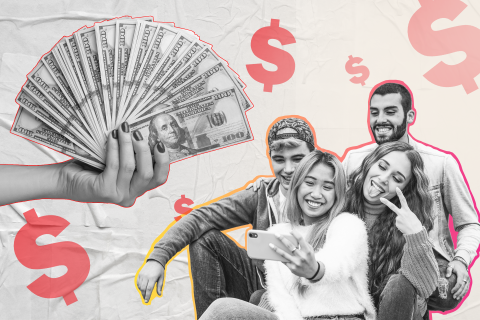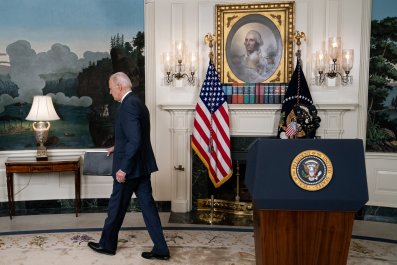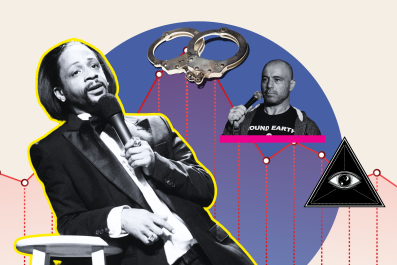Gen Z is embracing cash, despite digital money being the primary way of spending, saving and investing in 21st century life.
A 2023 study by HarrisPoll on behalf of CreditKarma found that 69 percent of Gen Zers in the U.S. and U.K. were using cash more than they did in 2022. Nearly a quarter, 23 percent, of those in the age bracket are using cash for the majority of their purchases.
The research checks out with the emergence of keeping large amounts of cash at home rather than keeping it in a bank account, current or savings, a trend that can be seen on social media. Using cash instead of a card or paying via online transactions has become increasingly popular on TikTok, with a myriad of accounts advising watchers on how to successfully do what is known as "cash stuffing."
Read more: Best High-Yield Savings Accounts
The budgeting hack involves withdrawing cash from your bank, often in large amounts, such as an entire monthly paycheck, and sorting it into envelopes or another system to keep at home. This way, budgeters can create "buckets" of money for certain expenditures, such as eating out, clothes, saving for a holiday, or anything they want to put their cash toward.

"The idea is that, once the money is gone from that envelope, you can no longer spend money on that bucket," Rod Griffin, senior director of consumer education and advocacy for Experian, told Newsweek.
While experts agree that the trend certainly isn't new, it seems to have surged in popularity with the social media generation.
The TikTok page for Monets Money, which has 1.3 million likes and almost 70,000 followers, has dozens of videos on how to do cash stuffing, explainers on what you need to know about the trend, and how to budget your monthly paycheck.
Another account, CDN Girl Cash Stuffer, which demonstrates similar tactics for storing your cash, has in excess of 220,000 followers, with one of her videos demonstrating cash stuffing having had 8.9 million views since April 2023.
Cash Stuffing—Good or Bad?
Experts are divided on the benefits of cash stuffing, with some raising legitimate concerns about the safety of the practice, while others say it can be an effective way to budget. Others point out that it can result from longstanding distrust of banks in certain ethnic communities.
Read more: How to Budget
"It seems as though they've started to become 'smarter' and realize that having easy access to spend isn't what it's made out to be," Christian Maldonado, Founder & CEO at Finsult said of "zoomers."
"Being able to just tap your phone for payment is showing Gen Z how their sporadic and mindless spending can spin out of control and affect their way of living," he told told Newsweek. "Cash is giving them a way to physically not only see their money but also tangibly appreciate it more since it's not on a screen, for example."
Financial analyst Doug Carey agrees that the use of cash in young people is good because it can help them manage their budgets.
"I believe the cash stuffing technique is actually a really good idea for a lot of younger people who have trouble with their budgets and a hard time saving money," he told Newsweek. "I force my younger children to use cash as much as possible so they feel the pain of spending the money that they earned. Unlike digital money, actual cash is tangible and can be seen and felt."
"You put the paper money in your wallet, and can physically see the bills declining when you're shopping," Erica Sandberg, personal finance expert at CardRates told Newsweek. "There is no distance between the transactions. Pulling out eight $20 bills to buy a pair of shoes feels more 'real' than tapping a card on a screen."
Sandberg said that as many Gen Z folks have grown up with their parents using cards instead of physical money it means they're more enamored with the novelty of using cash, describing it a "cool new invention" of sorts for the younger generation.
"Cash stuffing is a classic technique for a reason. It works," she said. "You determine how much money you want to spend on certain categories in a week or month. Add it to an envelope, and spend accordingly. When it's gone, you're done until the next cash infusion."
Teri Williams, president & COO of OneUnited Bank, explained to Newsweek that cash is commonly used by Black people in America because of a longstanding distrust of banks.
"There has always been a higher use of cash in the Black community, so for OneUnited Bank, the trend is not new," she said. "For Black Americans, there has been a historic distrust of banking and a belief that having cash is more secure."
Williams said she was not surprised to hear Georgia Attorney General Fani Willis speaking about keeping large amounts of cash in her house during a recent court hearing. Willis said she frequently keeps cash at home and uses it for spending after she was asked to explain why there was no banking trail relating to purchases made while traveling with Nathan Wade, the special prosecutor she has been accused of having an improper relationship with.
"As the nation's largest Black-owned bank, we have worked to improve trust in the banking system," Williams continued. "We also understand and respect our customers' interest in holding cash. Although there are many benefits to digital banking, using cash can help young people understand they are spending 'real money' and need to set limits on their purchases."
While this option may work for some, others have concerns about large amounts of cash being kept either at home or on your person.
"Gen Zers don't want to learn from their parents; they don't trust them," Kelly Ann Winget, CEO of Alternative Wealth Partners, told Newsweek. "They trust strangers on the internet, and, of course, it is common for young people to rebel to an extent. However, without real financial education and tools, the 'stuffing' strategy isn't sustainable, especially for growing wealth. Cash sitting in an envelope during a time when inflation is a tangible 10 to 20 percent for real Americans, loses value every day."
Erika Kullberg, a financial expert who has more than nine million followers on TikTok, said that opting to use cash forgoes some of the protection offered by banks.
"I'm not going to sugarcoat it—there are valid concerns when you move away from digital money," she told Newsweek. "Cash transactions can be cumbersome, and they lack the built-in fraud protection that digital methods provide."
Rod Griffin, senior director of consumer education and advocacy at Experian, told Newsweek that young people who just use cash may shut themselves off from opportunities in the future, like buying a home, as they can't develop a healthy credit score.
"Younger consumers may see these as distant goals, but the financial steps they take while they are young will impact them when it comes time to realize some of these goals," he said.











